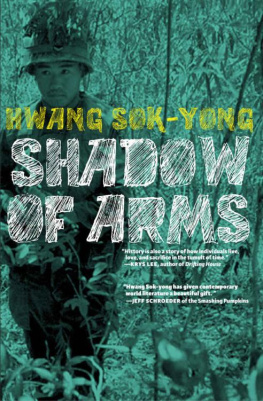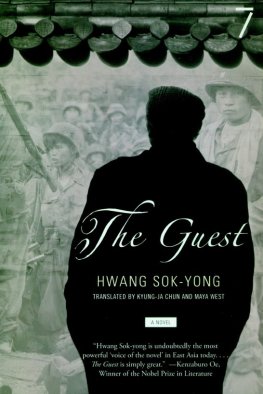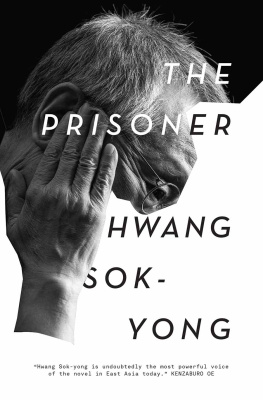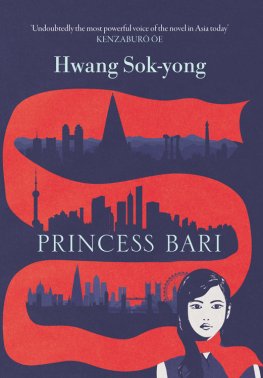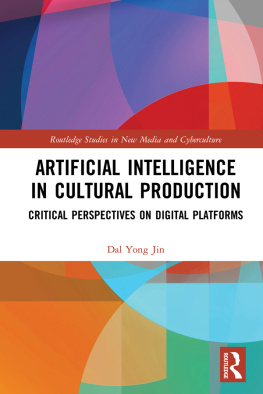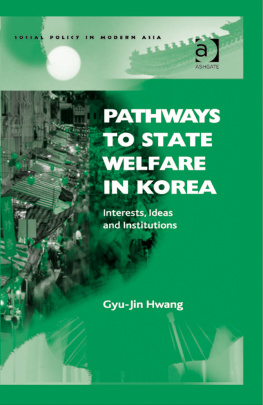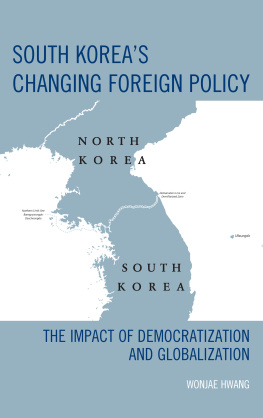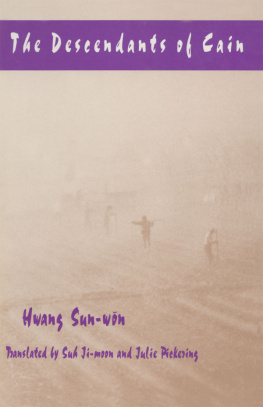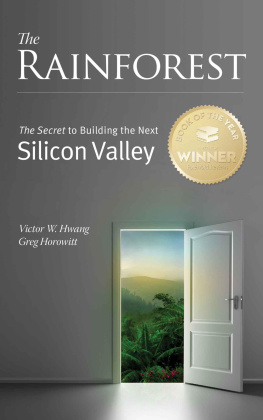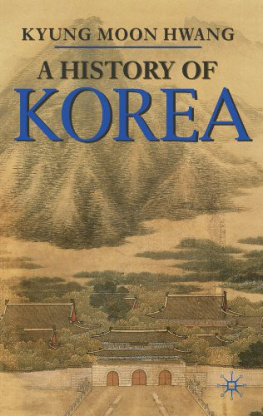Hwang Sok-Yong - The Shadow of Arms
Here you can read online Hwang Sok-Yong - The Shadow of Arms full text of the book (entire story) in english for free. Download pdf and epub, get meaning, cover and reviews about this ebook. year: 2014, publisher: Seven Stories Press, genre: Detective and thriller. Description of the work, (preface) as well as reviews are available. Best literature library LitArk.com created for fans of good reading and offers a wide selection of genres:
Romance novel
Science fiction
Adventure
Detective
Science
History
Home and family
Prose
Art
Politics
Computer
Non-fiction
Religion
Business
Children
Humor
Choose a favorite category and find really read worthwhile books. Enjoy immersion in the world of imagination, feel the emotions of the characters or learn something new for yourself, make an fascinating discovery.
- Book:The Shadow of Arms
- Author:
- Publisher:Seven Stories Press
- Genre:
- Year:2014
- Rating:5 / 5
- Favourites:Add to favourites
- Your mark:
- 100
- 1
- 2
- 3
- 4
- 5
The Shadow of Arms: summary, description and annotation
We offer to read an annotation, description, summary or preface (depends on what the author of the book "The Shadow of Arms" wrote himself). If you haven't found the necessary information about the book — write in the comments, we will try to find it.
The Shadow of Arms — read online for free the complete book (whole text) full work
Below is the text of the book, divided by pages. System saving the place of the last page read, allows you to conveniently read the book "The Shadow of Arms" online for free, without having to search again every time where you left off. Put a bookmark, and you can go to the page where you finished reading at any time.
Font size:
Interval:
Bookmark:
The
Shadow
of Arms
Copyright 1985, 1988 by Hwang Sok-yong
English translation 1994 by Cornell East Asia Program First Seven Stories Press Edition 2014.
All rights reserved. No part of this book may be reproduced, stored in a retrieval system, or transmitted in any form or by any means, including mechanical, electronic, photocopying, recording, or otherwise, without the prior written permission of the publisher.
Seven Stories Press
140 Watts Street
New York, NY 10013
www.sevenstories.com College professors may order examination copies of Seven Stories Press titles for free. To order, visit http://www.sevenstories.com/textbook or send a fax on school letterhead to (212) 226-1411.
Library of Congress Cataloging-in-Publication Data Hwang, Sog-yong, 1943
[Mugi ui kunul. English]
The shadow of arms / Hwang Sok-yong. -- A Seven Stories Press First Edition.
pages cm
Originally published in Korean as Mugi ui kunul.
Includes bibliographical references and index.
ISBN 978-1-60980-507-4 (alk. paper) 1. Vietnam War, 1961-1975--Fiction. I. Title.
PL992.29.S6M86513 2013
895.734--dc23
9 8 7 6 5 4 3 2 1
The
Shadow
of Arms
Hwang Sok-yong
Translated by Chun Kyung-Ja
Seven Stories Press
New York
Hwang Sok-yongs The Shadow of Arms , when first begun in 1983, was a courageous act of political witness. Under a ferocious dictatorship, the Vietnam War remained a taboo subject except as an anti-Communist crusade. Not only had our boys fought and died there in great numbers, but President Chun Doo Hwan himself, along with his closest aides, was a veteran of that war. And while the larger issue of anti-imperialism and national liberation was being hotly debated in the Korean radical movements, especially among students, in the wake of the Kwangju massacre of May 1980 when General Chun came to power, such debate met with frequent and harsh repression. And here was Hwang serializing in a well-known monthly magazine a novel of the Vietnam War which exposed the atrocities and corruption of the Allied war effort, clearly sympathizing with the cause of the National Liberation Front. Little wonder, then, that once the first half was finished and came out in book form in 1985, the project remained in abeyance until after the success of the nationwide election protest actions of June 1987.
That success of the democratic movement was only partial, however, and it still took considerable daring for the author to resume work on the novel under General Chuns successor and fellow Vietnam veteran Roh Tae Woo, bringing out the second and final volume in 1988. Freedom of expression continued to suffer severe restrictions, with any criticism of the US imperial role liable to be equated with subversiveness.
Today this particular aspect of the novel would seem to have lost much of its urgency even in South Korea, where the inauguration in early 1993 of the first civilian President in more than thirty years has brought a considerable improvement to the political and intellectual climate. To readers of the English version, especially in the United States, the almost exclusive denunciation of the latters roleaccompanied by little criticism of the atrocities committed by South Korean troopswould appear yet more dated and even self-indulgent. While partially granting these objections, I should like to remind such readers that, first of all, Hwangs offhand dismissal of any reason for the South Korean intervention other than the mercenary was in itself a pointed act of resistance and criticismone, moreover, hardly matched by any subsequent South Korean work of more overt self-criticism. I may add, too, that the political issues Hwang raises have not wholly lost their relevance either: in the United States, not all the attempts to be cured of the Vietnam syndrome can be welcomed as moves toward true civic health.
Yet The Shadow of Arms lives today mainly as a gripping tale dealing with a fascinating aspect of the Vietnam War: the black markets of the South Vietnamese city of Da Nang. Hwang himself had some firsthand experience of them as a soldier in the South Korean Marine Corps. The main character, Corporal (later Sergeant) Ahn Yong Kyu of the Joint Investigations Headquarters in Da Nang, actually reflects a good deal of that experience and some of Hwangs own resourcefulness and aplomb as well. True, the addition of some fictive adventures and removal of most autobiographical features tend to make the resulting characterization somewhat unrealespecially to foreign readers, since even the most expert translation cannot do justice to the racy vividness of the dialogue when the Koreans in the novel talk among themselves.
But Ahns character serves as the convenientand on the whole adequatefocal point in the exciting detective work on the complicated moves by the US, NLF, South Korean, and South Vietnamese interests, with their mixtures of strategic and venal motives. And I believe a good deal of the power of this novel derives from its being more than just a realistic presentation of a little-known aspect of the Vietnam War. For the black markets, with the PXs of the US Military as their main fountainhead, also serve as a synecdoche of a war which, for all its irrational carnage and wastefulness, was meant to promote the interests of the hegemonic capitalist power, and hence could be terminated only when the capitalists at home finally came to object to its ultimate unprofitability.
Seen in this light, however, the various episodes and subplots supplementing the main drama of the black markets, such as the conflict in the Pham family or the reports on the atrocities by American soldiers, suffer not only from the relative thinness of the authors firsthand knowledge but from a certain simplicity in his vision of Americas imperial role. This is not to say that the author ought to have actually depicted the more nuanced elements in the United States policy or performance. Rather, the crucial default, for a Korean novel of the 1980s, concerns the question of the nature and degree of the relevance of the anti-imperialist struggle in Vietnam to the aspirations of its Korean readers for their own reunification and genuine autonomy. The author no doubt was inspired by the similarities in the two struggles and powerfully brings some of them home. Yet given the at least equally weighty resemblances to the contrasting division of Germany, and indeed, the sui generis nature of what I have termed the division system on the Korean peninsula, some reflections on the differences between the national liberation struggle in Vietnam and a more complex endeavor to overcome Koreas division would seem to have been in order. Again, this is not to demand of the author any explicit treatment of the question. Yet some appropriate details on (say) the kind of person Ahn was before he came overseas could have put his experience in Vietnam in better perspective, as well as adding to the depth and credibility of the characterization.
At all events, Hwang Sok-yongs narrative skill manages to hold the readers attention to the breathtaking final shootout and beyond. There is, moreover, a profound irony in Ahn Yong Kyus being the man who kills Pham Minh, the NLF underground agent for whose cause and conduct the author had manifested the greatest sympathy. Perhaps the author himself does not sufficiently appreciate the irony, for in embarking for home in the last scene, Ahn does not seem to feel any particular remorse, nor does the author offer any criticism of his protagonist. But Ahn Yong Kyus repeated claim that South Koreans are in Vietnam simply to make what money they can, and that he himself (who is not at all venal) does only the minimum necessary for survival and honorable discharge, is given the lie by the tale. South Koreas involvement stands condemned according to the values most passionately championed by the novel itself. While the novels cold-eyed detachment from the US war endeavor leaves Korean readers with the task of a more complex moral reckoning, it will also disturb American readers by reminding them of the variety and pervasiveness of their involvement in the sufferings of other nations.
Font size:
Interval:
Bookmark:
Similar books «The Shadow of Arms»
Look at similar books to The Shadow of Arms. We have selected literature similar in name and meaning in the hope of providing readers with more options to find new, interesting, not yet read works.
Discussion, reviews of the book The Shadow of Arms and just readers' own opinions. Leave your comments, write what you think about the work, its meaning or the main characters. Specify what exactly you liked and what you didn't like, and why you think so.

